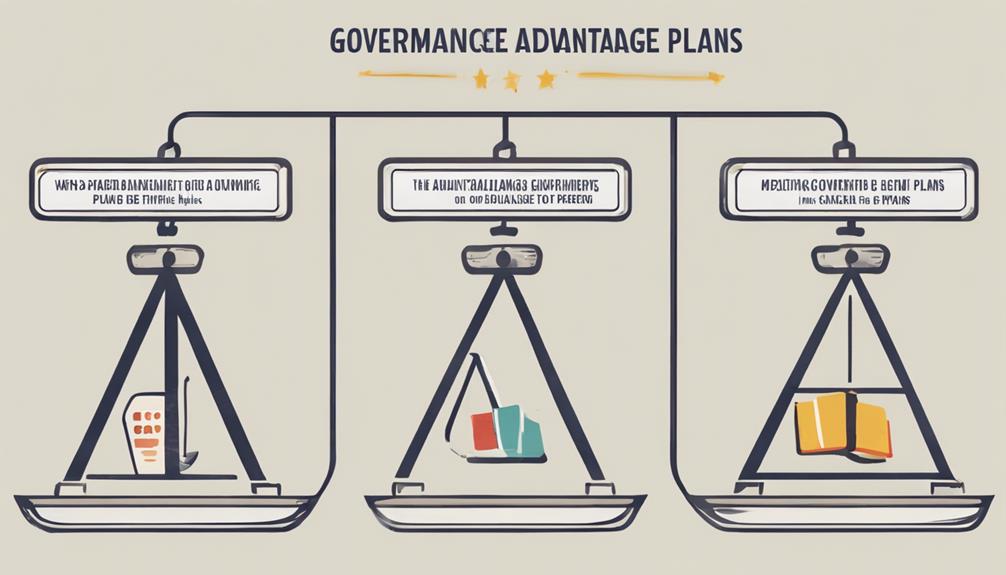Navigating the complexities of Medicare Advantage plans and their coverage for skilled nursing facilities can seem like navigating a maze with constantly changing pathways.
As we explore the nuances of this subject, it becomes evident that the coverage provided is subject to various conditions and limitations. Understanding these intricacies is crucial for making informed decisions about healthcare options and potential financial implications.
Stay tuned to unravel the layers of coverage details and considerations that can impact your access to skilled nursing care under Medicare Advantage plans.
Key Takeaways
- Limited to 100 days annually
- Understanding cost-sharing crucial
- Transition importance from hospital
- Comprehensive care with specific restrictions
Coverage Under Medicare Advantage Plans
Medicare Advantage plans cover a range of skilled care services at skilled nursing facilities, including medical treatments, rehabilitation, nursing care, and medication administration. These plans offer coverage for stays in skilled nursing facilities for up to 100 days per benefit period. To qualify for this coverage, patients must meet specific criteria and receive approval for skilled nursing facility care under Medicare Advantage plans. In addition to nursing care, coverage under Medicare Advantage plans for skilled nursing facilities may include therapy, medical services, and some ancillary services.
When individuals require skilled care services in a skilled nursing facility, Medicare Advantage plans can provide essential coverage to address their medical needs. This coverage encompasses a comprehensive approach to care, ensuring that patients have access to the necessary treatments, therapies, and nursing support during their stay. By meeting the specified criteria, patients can benefit from the services offered under Medicare Advantage plans, facilitating their rehabilitation and overall well-being in a skilled nursing facility.
Eligibility Criteria for Skilled Nursing Facilities

Upon meeting specific criteria, individuals can access skilled nursing facility care under Medicare Advantage plans when medically necessary. To qualify for skilled nursing facility (SNF) coverage under Medicare Advantage plans, beneficiaries must adhere to the following eligibility criteria:
- Qualifying Hospital Stay: Beneficiaries must have had a qualifying hospital stay of at least three consecutive days as an inpatient before being transferred to a SNF for further care.
- Daily Skilled Care Requirement: Beneficiaries must require daily skilled care that can only be provided in a SNF setting, such as physical therapy, intravenous injections, or wound care.
- Medicare-Certified SNF: The SNF where care is received must be Medicare-certified to ensure coverage under Medicare Advantage plans.
Meeting these essential criteria ensures that individuals receive the necessary skilled care in a Medicare-certified facility when transitioning from a hospital setting, emphasizing the importance of SNF coverage under Medicare Advantage plans for those in need.
Limitations of Medicare Advantage Coverage
Considering the constraints on coverage within Medicare Advantage plans, limitations regarding skilled nursing facility stays can significantly impact the extent and duration of care available to beneficiaries. Medicare Advantage plans may cap coverage for skilled nursing facility stays at 100 days per benefit period, potentially leaving beneficiaries responsible for coinsurance costs beyond the initial 20 days covered by Medicare Advantage. Furthermore, certain plans may impose restrictions on the types of skilled care services covered in a skilled nursing facility, further limiting the scope of care provided. Understanding these coverage limitations is crucial for individuals contemplating skilled nursing facility care.
| Aspect | Impact |
|---|---|
| Maximum Days Covered | Up to 100 days per benefit period |
| Coinsurance Costs | Possible costs after initial 20 days |
| Skilled Care Services | Restrictions on covered services |
Cost Considerations for Skilled Nursing Care

Analyzing the financial implications of skilled nursing care within Medicare Advantage plans sheds light on the cost dynamics involved in accessing essential services. When considering the cost considerations for skilled nursing care, there are several key points to keep in mind:
- Copayments and Coverage Period: Medicare Advantage plans may require copayments for extended stays beyond the initial coverage period for skilled nursing facility care. Understanding these costs is crucial for financial planning.
- $0 Copayments**: Some Medicare Advantage plans offer $0 copayments for the first 20 days of skilled nursing facility care. This benefit can significantly reduce out-of-pocket expenses for beneficiaries needing this level of care.
- Cost-sharing Requirements**: Beneficiaries should carefully review their plan details to comprehend the cost-sharing requirements for services like therapy and medical treatments in skilled nursing facilities. This understanding plays a vital role in informed decision-making regarding healthcare options.
Comparing Coverage With Traditional Medicare
Medicare Advantage plans provide coverage for up to 100 days of skilled nursing home care annually, offering a comprehensive alternative to Traditional Medicare for beneficiaries needing extended care services. One key difference is that Traditional Medicare relies on medical professionals for discharge decisions, whereas Medicare Advantage plans have the authority to determine the duration of nursing home care.
Additionally, Medicare Advantage plans include coverage from both Medicare Parts A and B, providing a more rounded approach to healthcare services. Moreover, these plans may offer additional benefits not covered by Original Medicare, enhancing the overall healthcare experience for beneficiaries.
When comparing coverage between Medicare Advantage plans and Traditional Medicare, it's essential to consider the flexibility, additional benefits, and authority in decision-making that Medicare Advantage plans provide. This comparison underscores the importance of understanding the nuances of each option to make informed decisions regarding skilled nursing home care coverage.
Frequently Asked Questions
How Many Days Will Medicare Pay 100% of the Covered Costs of Care in a Skilled Nursing Care Facility?
We'll pay 100% of covered costs for the first 20 days in a skilled nursing care facility. After day 20, beneficiaries might need to cover a $200 daily copayment from days 21 to 100.
Medicare will handle 100% of approved costs for the initial 20 days, but copayments may be necessary for days 21 to 100.
Medicare Part A allows coverage for up to 100 days per benefit period, potentially requiring additional payments after day 100.
What Is a Medicare Benefit Period for Skilled Nursing?
A Medicare benefit period for skilled nursing facilities covers up to 100 days of care per spell of illness.
It starts after a 3-day hospital stay and continues in the skilled nursing facility.
Medicare covers approved costs for the first 20 days, with a copayment for days 21-100.
Once 100 days are reached, Medicare no longer covers skilled nursing care.
Other benefits may still apply.
What Is a Common Reason for Admission to a Skilled Nursing Facility?
When considering admission to a skilled nursing facility, a common reason could be the necessity for rehabilitative care post-hospitalization. Patients often require specialized medical attention and therapy following surgeries or illnesses, which skilled nursing facilities offer.
These facilities provide intensive, short-term medical care and rehabilitation services to aid in recovery from various medical conditions. Admission to such facilities is recommended for those needing round-the-clock nursing care and support to regain independence after a recent hospital stay.
Does Medicare Supplemental Insurance Cover Long-Term Care?
We must clarify that Medicare supplemental insurance, or Medigap, generally doesn't cover long-term care.
It's essential to note that Medigap focuses on assisting with out-of-pocket expenses linked to Original Medicare, not prolonged stays in nursing homes.
For comprehensive coverage for long-term care needs, individuals should explore specific long-term care insurance policies rather than relying solely on Medigap plans.
It's crucial to consider these distinctions when planning for future healthcare expenses.
Conclusion
In conclusion, Medicare Advantage plans can be like a safety net, providing coverage for skilled nursing facilities under specific conditions. However, it's important to navigate through the limitations and potential costs involved.
Just like a delicate balancing act, understanding the eligibility criteria and comparing coverage options with traditional Medicare can help ensure you receive the care you need without breaking the bank.









